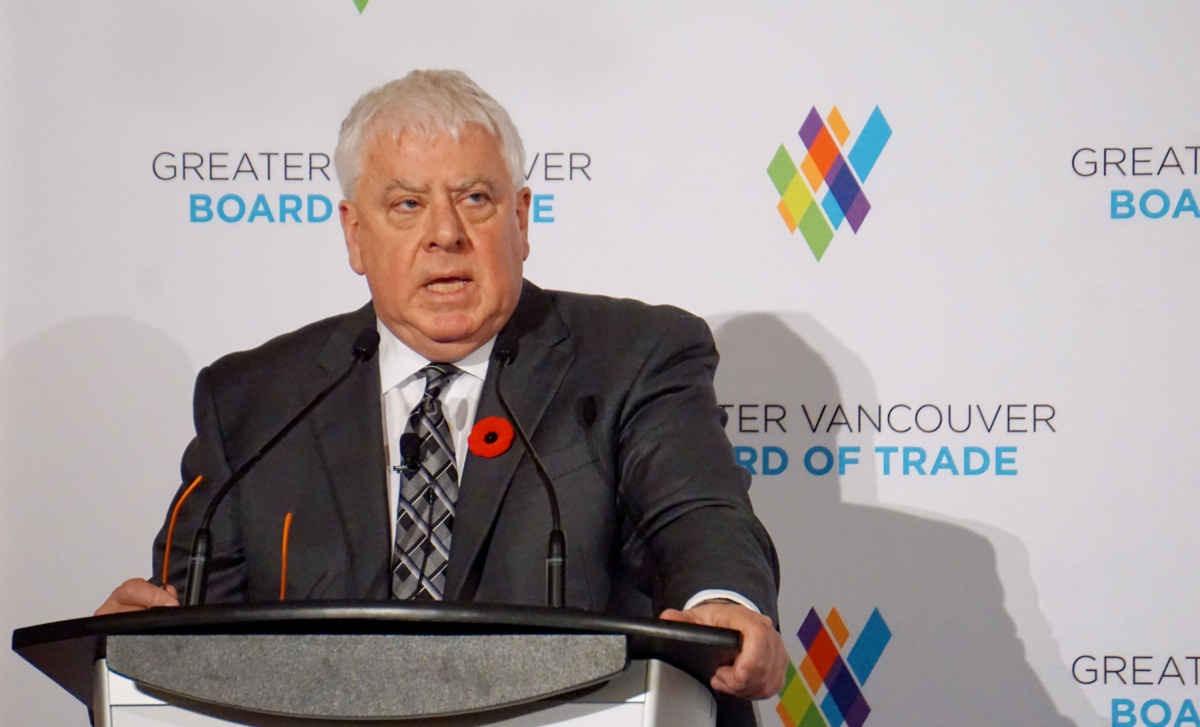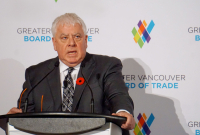Support strong Canadian climate journalism for 2025
“Trudeau’s Choice: jobs or whales” says the Globe and Mail article from November 27. I see it lying there on the coffee shop table and suddenly my blood pressure escalates faster than a Trump twitter battle. It appears that the old media, and perhaps a good many Canadians east of the Rocky Mountains, profoundly misunderstand British Columbia and its opposition to Kinder Morgan’s Trans Mountain Pipeline. Perhaps they also underestimate just how serious we are in that opposition. We will not let this project happen, period.
In the months and years ahead, the federal government and the multinational oil companies will learn just how vigorously and passionately British Columbians will defend our shared interests, as we stand together on the right side of history, though we may be cast as standing on the wrong side of "national interest".
I want to unpack this term for a moment, the national interest, as it was a cornerstone of the pro-pipeline argument put forward by the NEB and Alberta's political elite.
Riddle me this. How is a multinational corporation, headquartered in Houston Texas and transporting diluted tar to China, in Canada’s national interest? If you answer me that it’s “Alberta oil” I refer you to decades of Canadian energy companies being acquired by foreign corporations from Abu Dhabi, Thailand, Norway, Malaysia, even a $15 billion dollar takeover by the Chinese state-owned CNOOC recently.
In this era of neoliberalization it is absurd to make an argument that this project is in the national interest. It’s bordering on Orwellian double-speak, another one of those phantoms of decades past that somehow makes its way into today's debates. But perhaps that's fitting, as by siding with a sunset industry Alberta's politicians and the Prime Minister have signaled that they are living in the past.
Calgary's Mayor Nenshi even attempted to shame and rebuke British Columbians recently by evoking our province joining confederation with the promise of being a gateway to the Pacific for the rest of the country. To that, let me just say it’s not the 1800s anymore.
When that deal was made to dispossess Indigenous people of their lands and resources on behalf of a European Royal Family and investors in Ontario, the ocean was not acidifying beyond the point of ecological habitability, and average monthly and yearly temperatures weren’t inching towards levels unseen since before human civilization.
Interestingly enough, when Mr. Trudeau's father was Prime Minister, discussion of nationalizing (a portion of) the industry, like Norway did to build the world’s largest sovereign wealth fund, led to political hysteria that to this day has continued to enable western alienation and prairie populism to shape Canadian federal politics. Albertans were threatening to leave confederation over it.
When Alberta's politicians repeat the "national interest" argument it makes me feel like the only thing oozing in more volume out of Alberta than oil, is the hypocrisy and irony oozing from their mouths.
Perhaps the younger Trudeau is wary of political backlash from Alberta with this childhood memory in mind. The question now is whether his decision will help write a new chapter of British Columbian political alienation in the process? Will Trans Mountain be Justin Trudeau’s very own West Coast NEP moment?
To give credit where credit is due, Premier Notley has indicated that her government is on board with a proposed federal carbon pricing arrangement, building on their own work to introduce carbon pricing in the province. Some have speculated this might change the economics of the energy sector, making it more difficult to finance and recoup the costs of projects like Trans Mountain.
So, is the approval of Kinder Morgan’s twinning just a shrewd-centrist-Machiavellian sleight of hand?
British Columbians are on an emotional roller coaster right now, confused, feeling betrayed, at risk and defensive. Many of us are wondering why our concerns weren’t considered equally as part of Canada's national interest as Kinder Morgan's. And with respect to our friends, family and colleagues in Alberta, this about a multinational Houston-based corporation profiting at our risk, not about standing in the way of your prosperity or this country’s.
When we talk about the national interest we should be talking about Canadian people and our needs, not those of a foreign corporation exporting raw, unrefined, toxic gunk. A national poverty reduction plan would be in the national interest. So would a national housing strategy. A national mental health and addiction strategy with Provinces, municipalities and First Nations communities would be in the national interest. Not a pipeline for an American oil company.
Hard working British Columbians know that this project is not worth the risk, we stood with First Nations, a growing chorus of municipal leaders, MLAs, MPs, business leaders, scientists and activists to oppose this project and we will continue to, because we know that we don't stand alone.
While Prime Minister Trudeau stands on the other side of the Rocky Mountains with a flawed NEB process favouring an American corporation in a sunset industry, B.C. stands with the Water Protectors in North Dakota, with farmers that are blocking Keystone XL from threatening their livelihoods, we stand with middle-class families across North America fighting to protect their groundwater from fracking, and Chinese citizens who are demanding breathable air in their cities.
Because this is not about jobs or whales. It's about which side of history we will be remembered for standing on and the consequences of that choice for our children and our older selves. We hope our Prime Minister and other Provinces, overwhelmed by the truth of this, will be with us there one day soon.









Comments
Excellent article Thanx/Merci/Megwitch from the Canada Waking Up the Masses group
https://www.facebook.com/groups/canadawakingupthemasses/
Hear hear. Justin cannot continue to be a mugwump, His first big decision to come down on the side of big multinationalsmay be the beginning of a slippery slope. I noticed a big clump of NDP standing behind Chief Phillip at the announcement of the battle. Recall JT's pledge to honour the First Nations with consultation, and human rights, and justice? JT decided to honour Mr. Anderson of KM, and Alberta's continuing oil block instead of the FN. Let's see how it plays out.